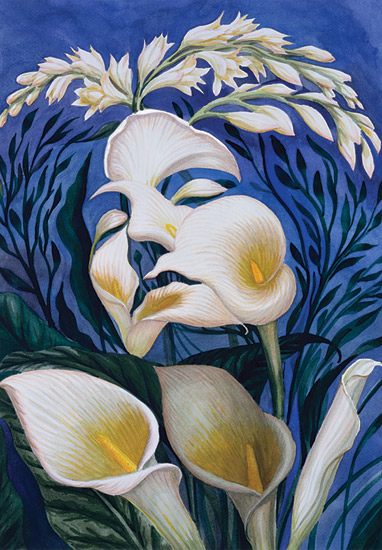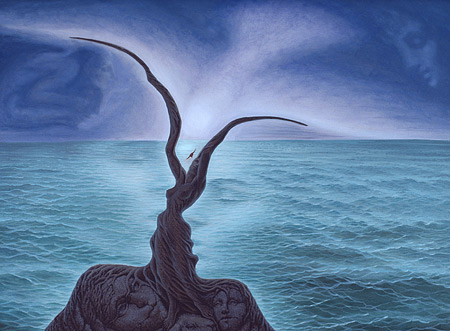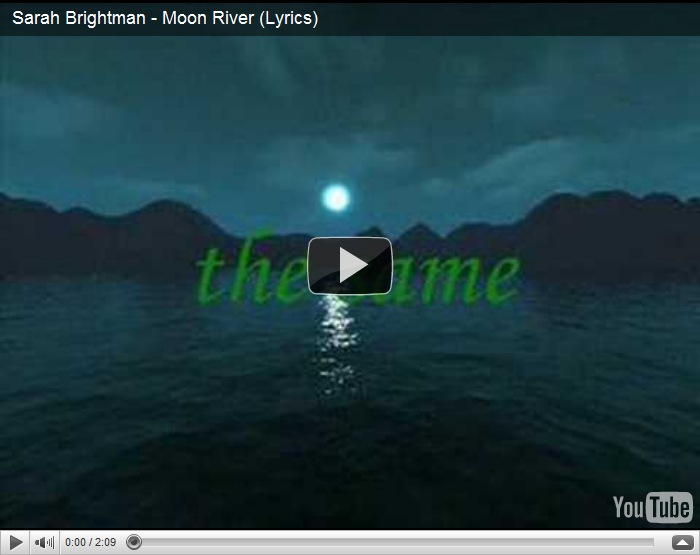 “Father & Son” used here with the kind permission of photographer John Dunne.
“Father & Son” used here with the kind permission of photographer John Dunne.
Discovery of a Father
Sherwood Anderson
One of the strangest relationships in the world is that between father and son. I know it now from having sons of my own. A boy wants something very special from his father. You hear it said that fathers want their sons to be what they feel they themselves cannot be, but I tell you it also works the other way. I know that as a small boy I wanted my father to be a certain thing he was not. I wanted him to be a proud, silent, dignified father. When I was with the other boys and he passed along the street, I wanted to feel a glow of pride: “There he is. That is my father.” But he wasn’t such a one. he couldn’t be.
It seemed to me then that he was always showing off. Let’s say someone in our town had got up a show. They were always doing it. The druggist would be in it, the shoe-store clerk, the horse doctor, and a lot of women and girls. My father would manage to get the chief comedy part. It was, let’s say, a Civil War play and he was a comic Irish soldier. He had to do the most absurd things. They thought he was funny, but I didn’t.’I thought he was terrible. I didn’t see how Mother could stand it. She even laughed with the others. Maybe I would have laughed if it hadn’t been my father.Or there was a parade, the Fourth of July or Decoration Day. He’d be in that, too, right at the front of it, as Grand Marshal or something, on a white horse hired from a livery stable. He couldn’t ride for shucks. He fell off the horse and everyone hooted with laughter, but he didn’t care. He even seemed to like it. I remember once when he had done something ridiculous, and right out on Main Street, too. I was with some other boys and they were laughing and shouting at him and he was shouting back and having as good a time as they were. I ran down an alley back of some stores and there in the Presbyterian church sheds I had a good long cry.
Or I would be in bed at night and Father would come home and bring some men with him. He was a man who was never alone. Before he went broke, running a harness shop, there were always a lot of men loafing in the shop. He went broke, of course, because he gave too much credit. He couldn’t refuse it, and I thought he was a fool. I had got to hating him. There’d be men I didn’t think would want to be fooling around with him. There might even be the superintendent of our schools and a quiet man who ran the hardware store. Once I remember there was a white-haired man who was a cashier of the bank. It was a wonder to me they’d want to be seen with such a windbag. That’s what I thought he was. I know now what it was that attracted them. It was because life in our town, as in all small towns, was at times pretty dull, and he livened it up. He made them laugh. He could tell stories. He’d even get them to singing. If they didn’t come to our house they’d go off, say at night, to where there was a grassy place by a creek. They’d cook food there and drink beer and sit about listening to his stories. He was always telling stories about himself. He’d say this or that wonderful thing had happened to him. It might be something that made him look like a fool. He didn’t care. If an Irishman came to our house, right away Father would say he was Irish. He’d tell what county in Ireland he was born in. He’d tell things that happened there when he was a boy. He’d make it seem so real that, if I didn’t know he was born in southern Ohio, I’d have believed him myself. If it was a Scotchman the same thing happened. He’d get a burr into his speech. Or he was a German or a Swede. he’d be anything the other man was. I think they all knew he was lying, but they seemed to like him just the same. As a boy, that was what I couldn’t understand.
And there was Mother. How could she stand it? I wanted to ask
but never did. She was not the kind you asked such questions.
I’d be upstairs in my bed, in my room above the porch, and
Father would be telling some of his tales. A lot of Father’s stories
were about the Civil War. To hear him tell it, he’d been in about
every battle. He’d known Grant, Sherman, Sheridan, and I don’t
know how many others. He’d been particularly intimate with
General Grant, so that when Grant went East, to take charge of all
the armies, he took Father along. “I was an orderly at headquarters, and Sam Grant said to me, ‘Irve,’ he said, ‘I’m going to take you along with me.’ ”It seems he and Grant used to slip off sometimes and have a quiet drink together. That’s what my father said. He’d tell about the day Lee surrendered and how, when the great moment came, they couldn’t find Grant. “You know,” my father said, “about General Grant’s book, his memoirs. You’ve read of how he said he had a headache and how, when he got word that Lee was ready to call it quits, he was suddenly and miraculously cured.” “Huh,” said Father. “He was in the woods with me.“I was in there with my back against a tree. I was drinking. I had got hold of a bottle. “They were looking for Grant. He had got off his horse and come into the woods. he found me. He was covered with mud. I had the bottle in my hand. What’d I care? The war was over. I knew we had them licked.” My father said that he was the one who told Grant about Lee. An orderly riding by had told him, because the orderly knew how thick he was with Grant. Grant was embarrassed. “But, Irve, look at me. I’m all covered with mud,” he said to Father. And then, my father said, he and Grant decided to have a drink together. They took a couple of drinks and then, because he didn’t want Grant to show up drunk before the immaculate Lee, he smashed the bottle against the tree.“Sam Grant’s dead now, and I wouldn’t want it to get out on him,” my father said. That’s just one of the kind of things he’d tell. Of course the men knew he was lying, but they seemed to like it just the same.
When we got broke, down and out, do you think he ever brought
anything home? Not he. If there wasn’t anything to eat in the
house, he’d go off visiting around at farmhouses. They all wanted
him. Sometimes he’d stay away for weeks, Mother working to keep
us fed, and then home he’d come bringing, let’s say, a ham. He’d
got it from some farmer friend. He’d slap it on the table in the
kitchen. “You bet I’m going to see that my kids have something to
eat,” he’d say, and Mother would just stand smiling at him. She’d
never say a word about all the weeks and months he’d been away,
not leaving us a cent for food. Once I heard her speaking to a
woman in our street. Maybe the woman had dared to sympathize
with her. “Oh,” she said, “it’s all right. He isn’t ever dull like most
of the men in this street. Life is never dull when my man is about.”
But often I was filled with bitterness, and sometimes I wished he
wasn’t my father. I’d even invent another man as my father. To
protect my mother, I’d make up stories of a secret marriage that for
some strange reason never got known. As though some man, say
the president of a railroad company or maybe a Congressman, had
married my mother, thinking his wife was dead and then it turned
out she wasn’t . So they had to hush it up, but I got born just the same. I wasn’t really the son of my father. Somewhere in the world there was a very dignified, quite wonderful man who was really my father. I even made myself half believe these fancies.
And then there came a certain night. Mother was away from
home. Maybe there was church that night. Father came in. He’d
been off somewhere for two or three weeks. He found me alone in
the house, reading by the kitchen table. It had been raining, and he was very wet. He sat and looked at me for a long time, not saying a word. I was startled, for there was on his face the saddest look I had ever seen. He sat for a time, his clothes dripping. Then he got up.
“Come on with me,” he said. I got up and went with him out of the house. I was filled with wonder, but I wasn’t afraid. We went along a dirt road that led down into a valley, about a mile out of town, where there was a pond. We walked in silence. The man who was always talking had stopped his talking. I didn’t know what was up and had the queer feeling that I was with a stranger. I don’t know whether my father intended it so. I don’t think he did.
The pond was quite large. It was still raining hard, and there were flashes of lightning followed by thunder. We were on a grassy bank
at the pond’s edge when my father spoke, and in the darkness and
rain his voice sounded strange.“Take off your clothes,” he said. Still filled with wonder, I began to undress. There was a flash of lightning, and I saw that he was already naked.
Naked, we went into the pond. Taking my hand, he pulled me in.
It may be that I was too frightened, too full of a feeling of strangeness, to speak. Before that night my father had never seemed
to pay any attention to me.“And what is he up to now?” I kept asking myself. I did not swim very well, but he put my hand on his shoulder and struck out into the darkness. He was a man with big shoulders, a powerful swimmer. In the darkness I could feel the movement of his muscles. We swam to the far edge of the pond and then back to where we had left our clothes. The rain continued and the wind blew. Sometimes my father swam on his back and when he did he took my hand in his large powerful one and moved it over so that it rested always on his shoulder. Sometimes there would be a flash of lightning and I could see his face quite clearly. It was as it was earlier, in the kitchen, a face filled with sadness. There would be the momentary glimpse of his face and then again the darkness, the wind, and the rain. In me there was a feeling I had never known before. It was a feeling of closeness. It was something strange. It was as though there were only we two in the world. It was as though I had
been jerked suddenly out of myself, out of my world of the schoolboy, out of a world in which I was ashamed of my father.He had become blood of my blood; he the strong swimmer and I the boy clinging to him in the darkness. We swam in silence, and in silence we dressed in our wet clothes. and went home.
There was a lamp lighted in the kitchen, and when we came in,
the water dripping from us, there was my mother. She smiled at us.
I remember that she called us “boys.” “What have you boys been
up to?” she asked, but my father did not answer. As he had begun
the evening’s experience with me in silence, so he ended it. He
turned and looked at me. Then he went, I thought, with a new and
strange dignity, out of the room. I climbed the stairs to my own room, undressed in darkness, and got into bed. I couldn’t sleep and did not want to sleep. For the first time, I knew that I was the son of my father. He was a storyteller as I was to be. It may be that I even laughed a little softly there in the darkness. If I did, I laughed knowing that I would never again be wanting another father.
http://www.mvrhs.org/english/shark/Headbar/Discovery%20of%20a%20Father.pdf
Note: I saw this photo in Google images and asked the photographer if I might use it on my blog. I love that it only includes hands and feet but you know that it is a father and son. I was looking for a photograph to accompany Sherwood Anderson's "coming of age" story--one of my favorites to this day. I used to teach it, and students started out being mildly interested but were always very moved by the end. Like a few other stories in my life, it has always remained with me. I hope you enjoy it.
Noelle
Information on the Author
June 17, 2008
Sherwood Anderson: All for Art
 The portrait of Sherwood Anderson on view in NPG’s Edward Steichen exhibition was taken for Vanity Fair by Steichen in 1925; Anderson biographer Kim Townsend records that as a great moment for Anderson, he was recognized by the magazine as “America’s most distinctive novelist.”
The portrait of Sherwood Anderson on view in NPG’s Edward Steichen exhibition was taken for Vanity Fair by Steichen in 1925; Anderson biographer Kim Townsend records that as a great moment for Anderson, he was recognized by the magazine as “America’s most distinctive novelist.”
Born in Camden, Ohio, on September 13, 1876, Anderson was the third of seven children. His father, Irwin McLain Anderson, was a Civil War veteran and a poor businessman, whose efforts to provide for his family led them to Clyde, Ohio. Anderson would always associate the town with his father’s inability to secure a steady means; later, in his writing, Anderson would replace Clyde with the fictional town of Winesburg.
Despite faulting his father for the family’s struggles, Anderson would carry a few faults of his own into four marriages. His first marriage, to Cornelia Platt Lane in 1904, provided Anderson some small happinesses—and three children—but he suppressed his desire to write while working as a copy writer and an executive in a series of businesses. Shortly after the birth of his daughter, Marion, Anderson experienced a breakdown of sorts. The following account is from Irving Howe’s biography, published in 1951:
On November 27, 1912, Anderson told his secretary, “My feet are cold and wet. I have been walking too long on the bed of a river.” A few minutes later he left the factory. He walked out of the town, and for four days he aimlessly wandered about until, on December 1, he was found in Cleveland by a pharmacist.
Although his marriage to Cornelia would survive almost another four years, it would do so only by the most sparse definition of survival. Anderson immersed himself in his writing, and he found much success. Also, his influence on the next generation of writers was great; Anderson boosted the careers of both Ernest Hemingway and William Faulkner. Kim Townsend writes:
From Hemingway’s perspective, Anderson was a man who could help him get there. Anderson did not help him much with his writing. In a few years Anderson would tell his other great protégé—William Faulkner— that he would gladly help him find a publisher for his book as long as he didn’t have to read it. Though he read more of what Hemingway wrote, Anderson helped him, as he would help Faulkner, mostly by his example. He represented professional success, he could say how you achieved it, he could say what you did to maintain it.
Anderson’s stories were well received into the 1920s, and to this day, his novel Winesburg, Ohio is a staple of the American literature classroom. Sherwood Anderson died in March of 1941 in Panama, just as he was beginning research for a work on South America. He is buried in Marion, Virginia, near his home, Ripshin.
References:
Irving Howe, Sherwood Anderson (Stanford: Stanford University Press, 1951).
Kim Townsend, Sherwood Anderson (Boston: Houghton Mifflin, 1987).
Sherwood Anderson, 1926/Edward Steichen/National Portrait Gallery, Smithsonian Institution; acquired in memory of Agnes and Eugene Meyer through the generosity of Katharine Graham and the New York Community Trust, The Island Fund
Posted at 04:20 PM in Biography | Permalink
 The Will o the Wisp ©Art Lionse with kind permission
The Will o the Wisp ©Art Lionse with kind permissionGalaxy ©Art Lionse with kind permission
Elfin©Art Lionse with kind permission





































